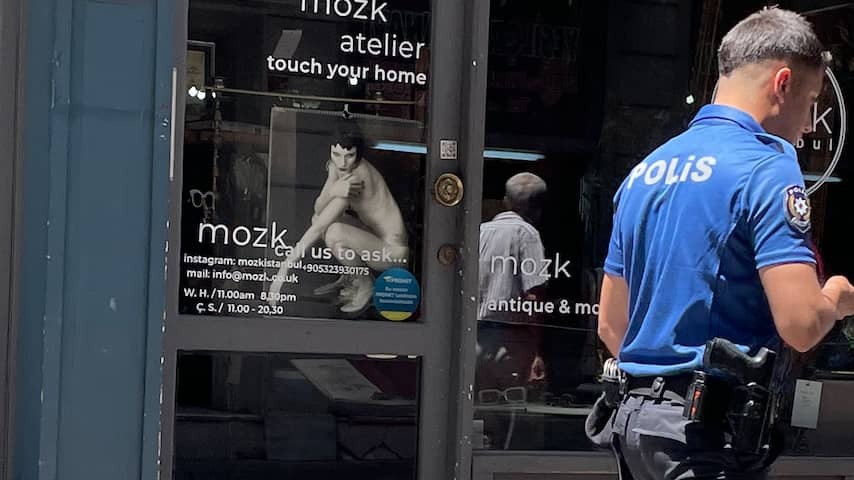
The LGBTQIA+ community is having a hard time in Turkey. President Recep Tayyip Erdogan harshly criticized them again on Wednesday. The risk of insult, threat, and abuse is high. Hasan and Tavjin felt compelled to leave.
Under Erdogan’s leadership, the Turkish LGBTQIA+ community is increasingly being cornered. This group of people is “perverse,” the president repeated on Wednesday. Resistance to the LGBTQIA+ movement is literally and figuratively vital for society, Erdogan recently said.
In Istanbul, the dust from yet another suppressed pride march is still settling. Activists attempted to come together last Sunday. With little success. It forms a stark contrast with, for example, Amsterdam, where Pride is celebrated this month. Many Turkish LGBTQIA+ individuals are at a crossroads: to stay or to leave?
“It was never a dream to leave my native country,” says Tavjin (28)*. She is a lesbian of Kurdish origin. “I wanted to be free and be myself, but in my own country. Unfortunately, that became impossible.”
Hasan (31), non-binary and queer, also felt compelled to leave. But for them, it was clear from childhood that there was no future in Turkey. Hasan grew up in Tokat, a small provincial town. They have always felt different. “But it was impossible to give substance to that in that place.”
‘My right to exist was taken away’
The first step was moving to Istanbul. In the anonymity of the big city, Hasan hoped to make a new start in 2018. And after some time, they managed to connect with the LGBTQIA+ community. A bitter necessity, they say. “If you want to be yourself, you need such a network. If only so you can inform someone as soon as you are arrested.”
Tavjin could endure it in her own social bubble for a long time. But outside of it, it was difficult. She experienced a double disadvantage; namely that of her Kurdish background and her sexuality. “Society does not accept you, and you are criminalized by the government. This not only gave me a feeling of insecurity, but also my right to exist was taken away,” she sighs.
‘The state is the driving force behind the intimidation of the LGBTQIA+ movement’
Lawyer Ali Gül also sees the climate for the LGBTQIA+ community rapidly deteriorating. “The state not only turns a blind eye to the hostility towards the community, but is increasingly the driving force behind it,” the lawyer tells NU.nl.
Last week, prior to Istanbul Pride, the website and X channel of KAOS GL were suddenly taken offline by order of the court. KAOS GL is committed to LGBTQIA+ rights and is the largest foundation of its kind in Turkey. The site had been active since 2007. “Our new X channel was also banned soon after its launch. We have to bend over backwards to remain visible online,” says Umut Güner of the foundation.
When Hasan tried to be themselves in Istanbul, the problems started. In the best case, it remained at name-calling, but several times a day. And not only in the conservative neighborhoods of the city. “People in Turkey who see themselves as LGBTQIA+-friendly often don’t know what to do with non-binary queer people. They don’t understand them. As a queer person, you are at a double disadvantage,” they say.
Yet Hasan wanted to stand up for LGBTQIA+ rights, but they were in for a rude awakening. In 2022, they participated in Istanbul Pride, which was banned by the authorities. The police intervened, and around 370 participants were arrested. “I grew up apolitical and never very activist. And now I suddenly saw how people around me were being beaten and taken away. It was a traumatic experience because I felt powerless.”
Hasan was still involved in the preparations for Pride 2023, but the experience of the previous year had made it clear to them: you can’t live like this.
Simply leaving Turkey was not an option. Due to an ongoing lawsuit, Hasan had been banned from traveling. But going back to prison was not an option either, they say**. “I am openly queer and suffer from the necessary health problems. Another prison sentence would have been my death.”
Hasan came into contact with smugglers, and after paying around 4,000 euros, they managed to reach Greece. Via a Greek prison, a refugee camp, and numerous temporary residences, including in Italy, they arrived in the Netherlands in May 2023.
Tavjin’s escape was simpler. She arrived as a tourist and then applied for asylum. “That was not an easy decision, but because of my reality in Turkey, it was a necessary decision.”
In the Netherlands, Hasan and Tavjin feel safer, but not 100 percent reassured. “A different political wind is blowing in the Netherlands, and the LGBTQIA+ debate is becoming polarized,” Tavjin sees. “Certain achievements seem to be up for discussion again.”
“We cannot sit back here,” says Hasan. “I fear that the Dutch LGBTQIA+ community will need our support in the near future. They just don’t realize it yet.”